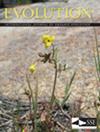Interacting phenotypic plasticities: Do male and female responses to the sociosexual environment interact to determine fitness?
IF 3.1
2区 环境科学与生态学
Q2 ECOLOGY
引用次数: 0
Abstract
Socially induced plasticity in reproductive effort is a widely documented phenomenon. However, few empirical studies have examined how male and female plastic responses to the social environment might interact in determining fitness outcomes. In field crickets, Teleogryllus oceanicus, males respond to rival song by increasing expenditure on seminal fluid proteins that enhance competitive fertilization success at the cost of reduced embryo survival. It remains unknown whether plastic responses in females could moderate the effects of male competitiveness on offspring performance. Here we used a fully factorial design to explore the interacting effects on fitness of male and female plasticity to the sociosexual environment. We found that female crickets exposed to male song increased the number of eggs produced during early life reproduction, which came at a cost of reduced offspring size. There was evidence, albeit weak, that interacting effects of male and female sociosexual environment contributed to variation in the hatching success of eggs laid by females. Lifetime offspring production was unaffected by the sociosexual environments to which upstream male and female plastic responses were made. Our data offer a rare test of the theoretical expectation that male and female plasticities should interact in their effects on female fitness.相互作用的表型可塑性:雄性和雌性对社会性环境的反应是否相互影响,从而决定适应性?
社会诱导的生殖努力可塑性是一种广泛记录的现象。然而,很少有实证研究探讨雄性和雌性对社会环境的可塑性反应如何相互作用,以决定适应性结果。在田野蟋蟀(Teleogryllus oceanicus)中,雄性会通过增加精液蛋白的消耗来回应对手的鸣叫,从而提高竞争性受精的成功率,但代价是降低胚胎的存活率。雌性的可塑性反应是否能缓和雄性竞争力对后代表现的影响仍是未知数。在此,我们采用全因子设计来探讨雄性和雌性对社会性环境的可塑性对适应性的交互影响。我们发现,接触雄性歌声的雌性蟋蟀在生命早期的繁殖过程中产卵数量增加,但其代价是后代体型减小。有证据表明(尽管很微弱),雄性和雌性社会性环境的相互作用导致了雌性产卵孵化成功率的变化。雌雄对上游社会性环境的可塑性反应并不影响后代的终生产量。我们的数据为雄性和雌性可塑性在影响雌性适应性方面相互作用的理论预期提供了一个罕见的检验。
本文章由计算机程序翻译,如有差异,请以英文原文为准。
求助全文
约1分钟内获得全文
求助全文
来源期刊

Evolution
环境科学-进化生物学
CiteScore
5.00
自引率
9.10%
发文量
0
审稿时长
3-6 weeks
期刊介绍:
Evolution, published for the Society for the Study of Evolution, is the premier publication devoted to the study of organic evolution and the integration of the various fields of science concerned with evolution. The journal presents significant and original results that extend our understanding of evolutionary phenomena and processes.
 求助内容:
求助内容: 应助结果提醒方式:
应助结果提醒方式:


